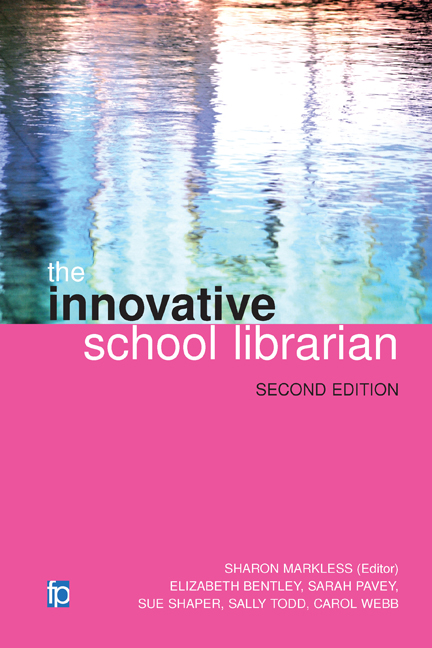Book contents
- Frontmatter
- Contents
- Preface
- Acknowledgements
- PART 1 WHO IS THE LIBRARIAN?
- 1 Professionalism and the school librarian
- 2 How others see us
- 3 Bridging the gap between how we see ourselves and how others see us
- PART 2 YOUR COMMUNITY: FROM PERCEPTIONS TO PRACTICE
- PART 3 MOVING FORWARD
- Appendix 1 Levels of education
- Appendix 2 School library self-evaluation questions
- Appendix 3 An example of a completed self-evaluation summary sheet
- Appendix 4 SWOT analysis
- Appendix 5 Choosing priorities in development planning: sample grid
- Appendix 6 Example of a force field analysis: a tool for managing change
- Appendix 7 Managing change: process and principles
- References
- Index
3 - Bridging the gap between how we see ourselves and how others see us
from PART 1 - WHO IS THE LIBRARIAN?
Published online by Cambridge University Press: 08 June 2018
- Frontmatter
- Contents
- Preface
- Acknowledgements
- PART 1 WHO IS THE LIBRARIAN?
- 1 Professionalism and the school librarian
- 2 How others see us
- 3 Bridging the gap between how we see ourselves and how others see us
- PART 2 YOUR COMMUNITY: FROM PERCEPTIONS TO PRACTICE
- PART 3 MOVING FORWARD
- Appendix 1 Levels of education
- Appendix 2 School library self-evaluation questions
- Appendix 3 An example of a completed self-evaluation summary sheet
- Appendix 4 SWOT analysis
- Appendix 5 Choosing priorities in development planning: sample grid
- Appendix 6 Example of a force field analysis: a tool for managing change
- Appendix 7 Managing change: process and principles
- References
- Index
Summary
A gap between practice and professional beliefs can arise in all sectors of the library world and, it appears, in all areas of education. Indeed, some experienced teachers are finding that the ideals that attracted them to the profession are no longer valued and that priorities they do not share rule the day. Cognitive dissonance is a term that describes what happens when someone has to absorb opposing points of view (Festinger, 1957) or when new information or a new interpretation of information challenges existing knowledge or ideals (Atherton, 2013). We may experience this when our vision differs from that of our school community. What may seem the ‘professional pathway’ for us may conflict with the school leadership's plans. When this happens, a dichotomy may arise between principles and practice and we will need to bridge the gap between others’ expectations and our beliefs.
Is there always a dichotomy between principles and practice?
What level of congruence between our own ideology and our school's requirements should we expect? We frequently reconcile ourselves to the fact that not everything can be ideal and we will not always be in total sympathy with our employers. Unfortunately, as time goes by, tensions may develop when we are constrained to act against our values, in order to comply with the school's outlook, and so a gulf between belief and practice may emerge. The cognitive dissonance we experience may cause a gradual modification in our views as a result of accom - modating to the school's required behaviour. On the other hand, a confident practitioner might take a job exactly because of that challenge, because it offers the opportunity for them to make a real difference. Influence and impact can work both ways in reconciling opposing views.
Sometimes we do not have access to the vision and strategy of our senior leaders and instead we are on the receiving end of operational necessities. If we do not understand the bigger picture it is easy to perceive a conflict between our own ideas and those of the leadership team. In our turn, we may not take steps to communicate our vision of the library and where it sits in the work of the school. We need to understand what is going on and not necessarily characterize it as a gap.
- Type
- Chapter
- Information
- The Innovative School Librarian , pp. 39 - 50Publisher: FacetPrint publication year: 2016
- 2
- Cited by



